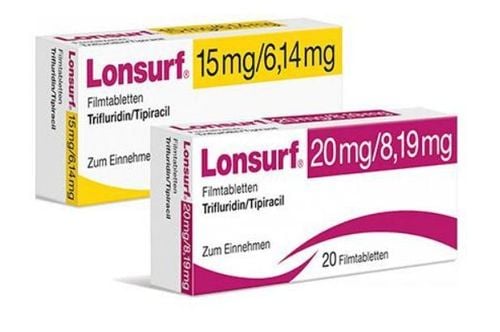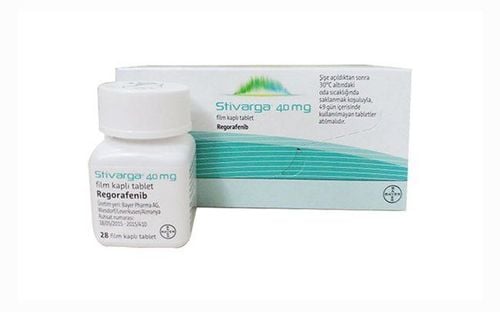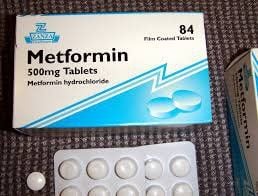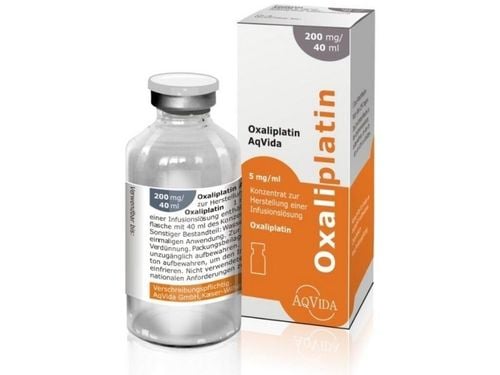This is an automatically translated article.
Hypoglycaemia below 3 mmol/l is often accompanied by neurological symptoms and may even lead to altered state of consciousness including coma. In cancer patients, this is a complicated situation, which can be caused by drugs to control diabetes or undernutrition, severe infection....
1. Approach to hypoglycemia in cancer patients
The decrease in serum glucose concentration leading to hypoglycemia is fully manifested by symptoms of neurosis, with changes in the level of consciousness, including coma. Doctors who treat cancer patients face more difficult situations than those who do not have underlying malignancies.
Clinical manifestations of hypoglycemia in cancer patients are similar to those in Whipple disease, including: Low blood sugar, co-occurs with symptoms of hypoglycemia, and is likely to go into remission after road compensated. In which, the neurological symptoms of hypoglycemia depend on the degree of decrease in glucose concentration, classified into 2 groups:
Neurological symptoms related to sympathetic activation: Sweating, tremors tremors, fast heartbeat, anxiety, and feeling hungry; Neurological symptoms due to neuronal dysfunction: weakness, fatigue and in severe cases coma or eventually death. In cancer outpatients, in addition to overdose of hypoglycemic drugs (whether intentional or unintentional), the causes of hypoglycaemia can be excessive dietary restrictions, anorexia due to depression, and hypoglycemia. exhaustion or alcohol abuse.
In the hospital, in addition to the causes of hypoglycemia listed above, it may also be due to the patient's more serious comorbidities (malnutrition, severe sepsis, liver, kidney or heart failure). ), at this time hypoglycemic coma is a sign of severe prognosis.
In terms of hormones, hypoglycemia can be considered a sign of an endocrine disorder due to hypopituitarism or low glucagon levels. Anatomically, hypoglycemia may be the result of gastric bypass surgery, short bowel syndrome, or other post-cancer conditions.
In addition, hypoglycemia is also a manifestation of malignancy itself, which can be divided into groups to approach as follows:
Hypoglycemia with high insulin levels: This is a symptom of endocrine tumors neuroendocrine - adenoma (islet cell tumor) or dysfunction of pancreatic β-cells - nesidioblastosis. However, in many cases known as tumour-induced hypoglycemia, the agent causing hypoglycemia is not insulin but its structurally similar polypeptide, somatomedin A also known as insulin-like growth factor II and hypoglycemia is referred to as hypoglycemia due to a stem cell tumor. Other substances produced by the tumor may also interfere with glucose metabolism, including insulin receptor antibodies and various cytokines (tumor necrosis factor-α, interleukin-1 and -6). and catecholamines (in adrenal myeloma). Tumor growth can cause hypoglycemia when they invade and destroy the liver or adrenal glands. In any case, the search for the cause of hypoglycemic coma in cancer patients is complex, but omissions should be avoided. This will help guide the diagnosis of the problem and the treatment will be effective, preventing hypoglycemia from recurring.
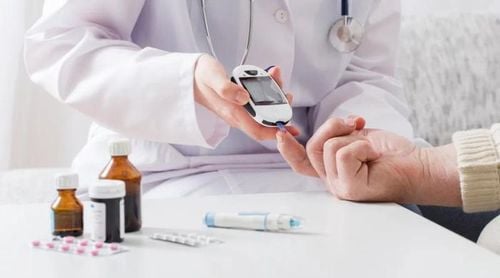
Hạ đường huyết có thể xem là 1 dấu hiệu của sự rối loạn nội tiết do suy tuyến yên hoặc mức glucagon thấp
2. How to diagnose hypoglycemia in cancer patients
The feeling of low blood sugar can be very different from person to person, when the disease turns into a coma it is late to be discovered. Therefore, it is necessary to diagnose hypoglycemia in cancer patients by rapid blood glucose test using capillary blood at the tip of the finger. This technique helps diagnose or exclude hypoglycemia in cancer patients for appropriate intervention.
Finding the cause of hypoglycemia in cancer patients first needs to determine whether it is related to insulin levels or not, through insulin tolerance tests. This should be considered as an initial step in the diagnosis of a patient with hypoglycemia without evidence of diabetes mellitus. Thereby, the physician can review the patient's history, the findings of hypoglycemia-reactive hormone deficiency, or in patients with no obvious cause of hypoglycemia, to help differentiate the condition. Increased endogenous and exogenous insulin with other causes.
In addition, measurement of insulin antibodies is also recommended, however, it is not necessary to perform immediately while the patient is hypoglycemia. If the result is positive, insulin-induced autoimmune hypoglycemia can occur, although rarely, with possible causes of autoantibody abnormalities produced by the tumor.
In patients who already have evidence of endogenous hyperinsulinemia, imaging studies and biopsies will help look for and confirm the presence of an insulin-secreting pancreatic tumor (insulinoma). Abdominal ultrasonography is available but has low sensitivity and specificity, which can be improved by computed tomography, nuclear magnetic resonance, and scintigraphy. The gold standard to confirm pancreatic tumor is to perform endoscopic pancreatic ultrasound, which also allows biopsies to determine the malignant nature of the tumor to guide future treatment.
3. How to treat hypoglycemic coma in cancer patients
As with any hypoglycaemic state, when a hypoglycemic coma is detected in a cancer patient, appropriate immediate hypoglycaemic treatment is required, either with intravenous glucose or glucagon. . If the patient is being treated with drugs that control blood sugar, they should be discontinued, especially insulin or drugs that stimulate insulin secretion by pancreatic cells. Thereafter, an increase in oral nutrition, sometimes accompanied by parenteral nutrition, should be maintained for several days. However, while this can help stabilize blood sugar levels, it is not a long-term solution. In particular, nutritional therapy should be focused, especially in patients with terminal cancer who are severely exhausted or have metastases that invade important organs, both to help maintain health and prolong life. both primary prevention or recurrence of hypoglycaemic coma.
Complete removal of the primary tumor in cancer patients can also cure and restore blood sugar. However, for many patients, this is often delayed or not feasible, because there is no clear standard of treatment for the management of such tumors. In selected cases, systemic or local chemotherapy, tumor embolization, or radiation therapy may be effective.
On the other hand, in melanoma, hypoglycemia is mainly due to the effects of insulin. Therefore, in this case, the standard hypoglycaemic treatment plan in patients with comorbid diabetes should be selected to both help bring about effectiveness and minimize the side effects of hypoglycaemia.
In summary, hypoglycemia in cancer patients is a common clinical condition. However, accessing an accurate diagnosis of this condition can sometimes be difficult, requiring good understanding and especially the courage to think about whether a rare diagnosis is related or not. regarding malignancy. Regardless of the situation, nutrition in cancer patients still plays a central role to focus on, as the first line of supportive treatment in most cases.
Currently, early cancer screening is considered the perfect measure in the timely detection and treatment of all types of cancer. Reduce the cost of treatment and especially reduce the mortality rate in patients. Vinmec International General Hospital always deploys and introduces to customers the Early Cancer Screening Package at Vinmec - Peace of mind to live well to help with gene testing, imaging, testing of biomarkers to detect tumors you early.
Choosing the Early Cancer Screening Package at Vinmec - Peace of mind at Vinmec, customers will get:
Only one gene test can assess the risk of 16 common cancers in both men and women ( Lung cancer, colorectal cancer, breast cancer, pancreatic cancer, cervical cancer, stomach cancer, prostate cancer, ....) Early detection of early signs of cancer cancer through imaging, endoscopy, and ultrasound. The operation is simple, careful and accurate. A team of well-trained specialists, especially in oncology, are capable of handling cancer cases. Not only has a system of modern and advanced medical facilities and equipment, Vinmec also has a team of doctors with deep expertise and experience, ensuring to help the examination and treatment process at the hospital. become fast with high efficiency, saving cost and time.
Please dial HOTLINE for more information or register for an appointment HERE. Download MyVinmec app to make appointments faster and to manage your bookings easily.




